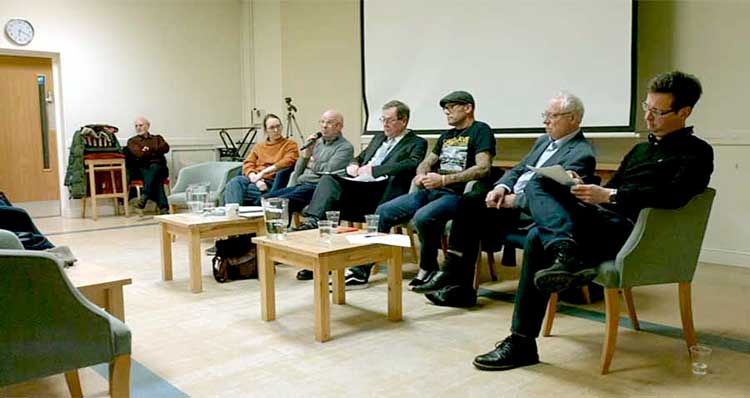The Legacy of the Miners’ Strike 1984/5
A Thoroton Society panel discussion (21 March 2024)
To commemorate the 40th anniversary of the start of the Miners' Strike of 1984-5, the Thoroton Society brought together a panel of former miners and academic researchers to reflect upon the legacy of the dispute and discuss some of the complex issues arising from it. The event was filmed in Ultra High Definition, but a condensed file size (with lower resolution) has been made available here. We hope it will prove a valuable record of the event for future students and historians, as well as Thoroton Society members. The event is presented in its entirety as delivered on the evening.
The video of the panel discussion can be viewed on the University of Nottingham website.
The Thoroton Society's Newsletter editor, Paul Baker, was at the event and offers his reflections below.
With John Hess, former political editor of BBC East Midlands, and a Thoroton Society Member, chairing this evening, the meeting was both enlightening and a trip down memory lane for the audience. The panel consisted of two former miners from the 1980’s, Dr David Amos, now a community historian, and Ken Bonsall, now a musician, and the historians Robert Gildea, Emeritus Professor of History at the University of Oxford, Dr Jörg Arnold, who researches and teaches social and cultural history at the University of Nottingham, and Dr Florence Sutcliffe-Braithwaite, who specialises in 20th Century British History at University College, London. All the panellists contributed to the evening by their first-hand knowledge and academic research. They drew on many different elements in the complex story of this dispute, helping to re-examine one of the defining moments in the history of coal mining in this country.
The miners’ strike of 1984 was a turning point in industrial relations. Miners left their pits to fight the Conservative government of Margaret Thatcher, and the battle cry of ‘close the pit, kill a community’ is remembered by many to this day. The miners were powerfully backed by their wives, mothers, daughters, and sisters, who were sure that, without the pit, there was little future for their children.
Amongst the many aspects of the dispute which were covered by the panel was the distinctive position which Nottinghamshire played, not only in UK mining nationally but in the strike itself. As is well known, many Nottinghamshire miners continued to work throughout the dispute, as they considered the strike to be unconstitutional. Despite the hostility to which this exposed the working miners, Nottinghamshire became the hub of the anti-strike movement and played a leading role in confrontations between police, striking- and working-miners. The Nottinghamshire coalfield was very significant as it bordered the Yorkshire coalfields and became a front line, dividing communities, dividing families and dividing the National Union of Mineworkers. The working miners and their families were subjected to widespread hostility because of their refusal to strike. In strike communities, women displayed impressive levels of unity and action, with many organisations providing food parcels, encouragement and support on the picket line alongside their men. Some women were arrested and went to prison because of their direct support for the strike.
Today, perspectives on the dispute are informed by the longer-term process of deindustrialisation which occurred in the United Kingdom after 1945. This not only affected the coal mines, but, also locally, the textile industries. The panel discussed some of the after-shocks caused by the closure of pits within mining communities; Ken Bonsall memorably described the knock-on effects in pit villages such as Easington in County Durham as like a ‘slow motion suicide’. For many, unemployment, poverty and social problems (including drug-related issues) became a grim reality. However, both Ken Bonsall and David Amos represent some longer-term positive outcomes – David went on to obtain his undergraduate and postgraduate degrees after leaving mining in the 1990s whilst Ken forged a new career as a musician, whose songs are informed by his politicisation during the miners’ strike, as well as his wider perspectives on labour history. At the end of the evening, Sarah Wimbush, an award-winning poet and author of ‘STRIKE’, a moving and important anthology of poems, which captures the turbulence of the dispute and the spirit of a marginalised community on the verge of profound change, read two of her poems.
< Previous
